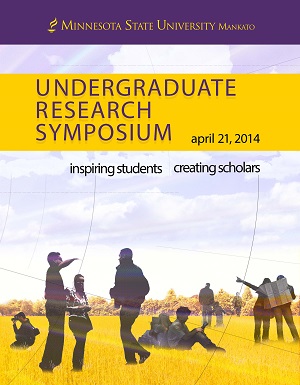Musical Aptitude and Tonal Languages
Location
CSU Ballroom
Start Date
21-4-2014 2:00 PM
End Date
21-4-2014 3:30 PM
Student's Major
Anthropology
Student's College
Social and Behavioral Sciences
Mentor's Name
Chelsea Mead
Mentor's Email Address
chelsea.mead@mnsu.edu
Mentor's Department
Anthropology
Mentor's College
Social and Behavioral Sciences
Description
Language and music are used on a daily basis with both phenomena employed to communicate and express human thoughts, feelings, and information. In the past, researchers have examined these methods of communication separately, but in modern research, linguists have begun to investigate the relationship between language and music. Within this area of research, there have been several studies completed on whether or not people with a tonal language as their first language have increased capabilities with music. Because this is a newer research field, very little research has been conducted on if people with Mandarin Chinese as their first language have better musical abilities. My research project, “Musical Aptitude and Tonal Languages”, addresses this issue through two interviews with native Mandarin Chinese speakers and two analyses of Gavin Bidelman and Diana Deutsch’s research. The two interviews did not yield any results, although they did provide potential topics for future research. Bidelman and Deutsch’s research suggest that there is a moderate correlation between knowing a tonal language and having musical aptitude. This is evident in Bidelman’s research as tonal language speakers could match pitch at the same accuracy as non-tonal language-speaking musicians. Deutsch’s research indicates the correlation by showing that tonal-language speakers could match pitches better than non-tonal language speakers. All of this demonstrates that there indeed is a moderate correlation between knowing a tonal language and having increased musical aptitude.
Musical Aptitude and Tonal Languages
CSU Ballroom
Language and music are used on a daily basis with both phenomena employed to communicate and express human thoughts, feelings, and information. In the past, researchers have examined these methods of communication separately, but in modern research, linguists have begun to investigate the relationship between language and music. Within this area of research, there have been several studies completed on whether or not people with a tonal language as their first language have increased capabilities with music. Because this is a newer research field, very little research has been conducted on if people with Mandarin Chinese as their first language have better musical abilities. My research project, “Musical Aptitude and Tonal Languages”, addresses this issue through two interviews with native Mandarin Chinese speakers and two analyses of Gavin Bidelman and Diana Deutsch’s research. The two interviews did not yield any results, although they did provide potential topics for future research. Bidelman and Deutsch’s research suggest that there is a moderate correlation between knowing a tonal language and having musical aptitude. This is evident in Bidelman’s research as tonal language speakers could match pitch at the same accuracy as non-tonal language-speaking musicians. Deutsch’s research indicates the correlation by showing that tonal-language speakers could match pitches better than non-tonal language speakers. All of this demonstrates that there indeed is a moderate correlation between knowing a tonal language and having increased musical aptitude.
Recommended Citation
Berg, Laura. "Musical Aptitude and Tonal Languages." Undergraduate Research Symposium, Mankato, MN, April 21, 2014.
https://cornerstone.lib.mnsu.edu/urs/2014/poster_session_B/1




